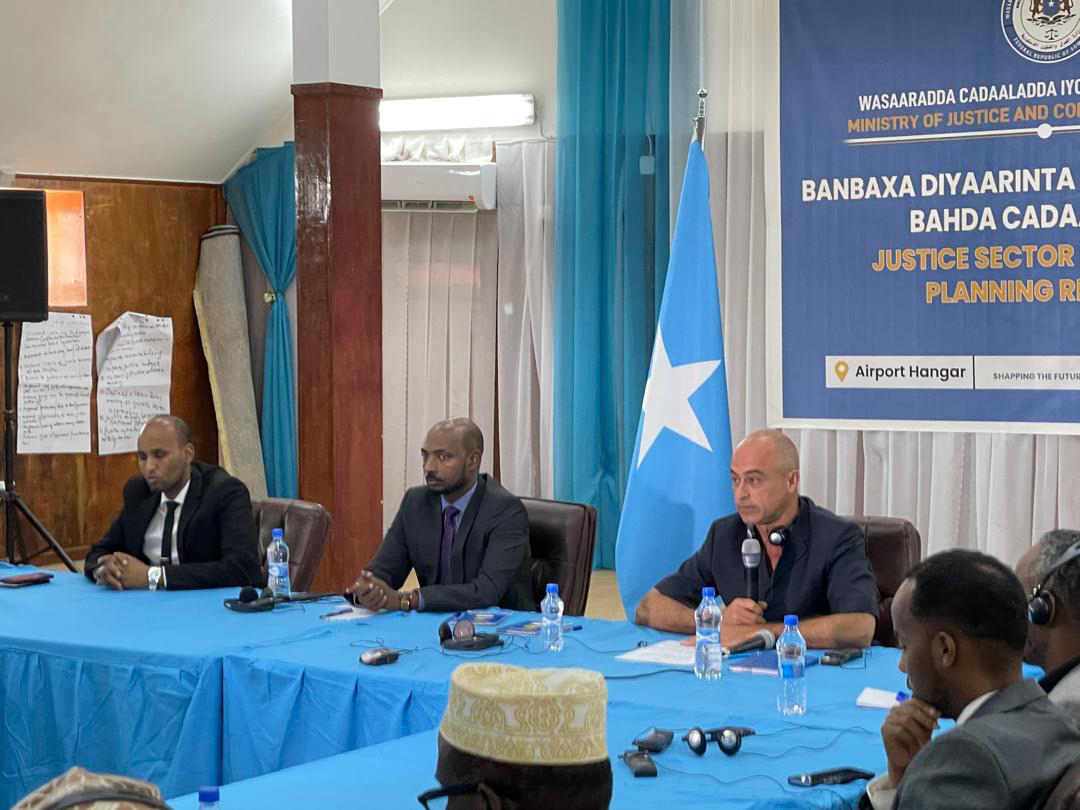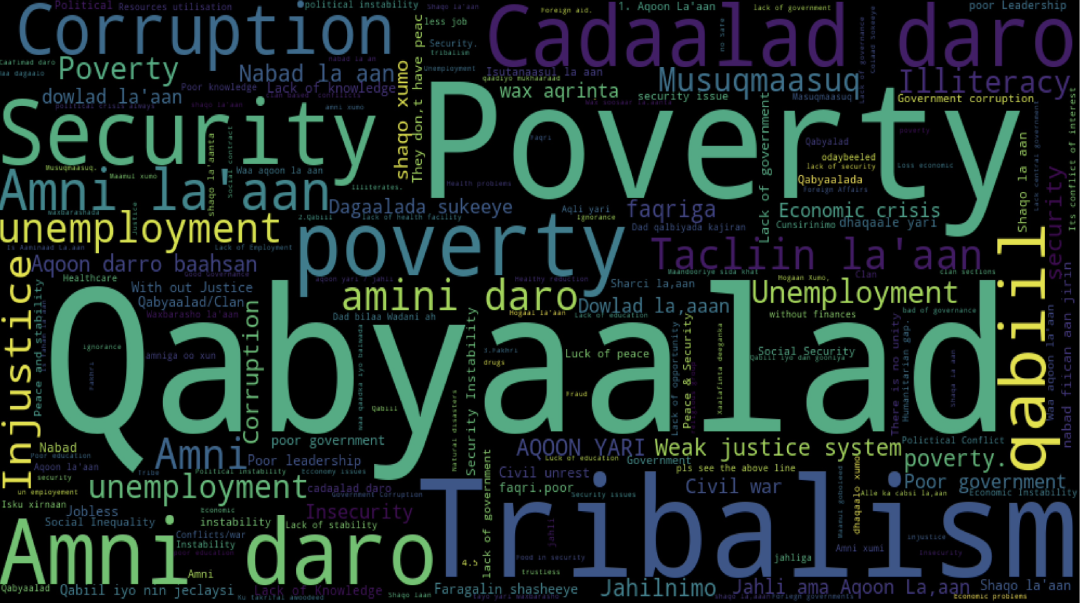Disclaimer:
Please be aware that the content herein has not been peer reviewed. It consists of personal reflections, insights, and learnings of the contributor(s). It may not be exhaustive, nor does it aim to be authoritative knowledge.
Title
Please provide a name for your action learning plan.
Justice system transformation
Challenge statement
Challenge type: If you are working on multiple challenges, please indicate if this is your "big bet" or "exploratory" challenge.
Please note: we ask you to only submit a maximum of 3 challenges - 1x Big Bet, 2x Exploratory. Each challenge must be submitted individually.
BIG BET
Challenge statement: What is your challenge? (Please answer in specific terms: "Our challenge is that...”.)
Our challenge is based on an initiative to transform the complex justice system in Somalia, which is made up of the traditional, religious and the official government. Our challenge is to assist in understanding the complexity and building a transformative strategic plan for the Ministry of Justice.
Background: What is the history of your challenge? What is causing or driving it? Who is involved? How does the current situation look like? What undesired effects does it produce?
While during the conflict, the formal justice sector collapsed, today, Somalia is starting to rebuild its formal justice system, which needs further maturing and development. Federal Member States (FMS) started establishing their respective justice systems. However, the justice system, particularly at the level of the FMS except for Puntland, which is at a more advanced stage, still suffers from significant capacity deficits. Moreover, significant levels of corruption and clan influence are affecting the impartiality of courts as well as the overall performance of justice services in terms of court administration and case management. For instance, FMS-based courts and the AGO lack proper procedures to receive and manage cases, the legal justification of court decisions/ruling is poor with abstract reference to sharia law playing a preponderant role. Court rulings at the level of many FMS seem to be permeated by a degree of arbitrariness and legal insecurity which is exacerbated by justice personnel being sometimes prone to collecting informal court fees due to irregular payments received by justice sector staff. In addition, bribery and corruption are concrete risk factors due to weak levels of accountability and oversight.
In light of the above, there is evidence that communities appear to have little confidence in state justice institutions that have a reputation for being corrupt and partial. On the other hand, traditional law and justice mechanisms (the so-called “xeer”) are far from devoid of impartiality. In its traditional format, xeer justice is heavily biased in favor of majority clans. Regardless of whether they are the plaintiff or defendant, majority clan members have an incentive to see their case tried through xeer; whereas, for minority clan members, these dynamics act as a disincentive to use xeer if their case involved majority clan members on the opposite side of their case. Hence, clan affiliations carry important weight in xeer since the authority of clan elders is prone to be (ab)used to influence the ruling. Fairness, due process, and impartiality are not necessarily the priority, as a “good outcome” might not always be defined by a fair verdict. Additionally, the traditional justice system tends to pay attention to clans’ interests or needs at the expense sometimes of individual needs and rights.
Nevertheless, “xeer” remains an important alternative to the lack of trust and confidence in the absence of formal justice institutions. Traditional courts remain the main providers of justice services in terms of the overall quantity of cases managed. Especially in locations with weak formal justice institutions, decisions reached by customary tribunals consisting of elders through applying xeer-based arbitration, are often officially registered by the official court system. This act implicitly confers a degree of official acknowledgment (if not recognition) to traditional dispute resolution mechanisms resulting in mediation or arbitration under customary law. Additionally, 16 alternative disputes resolutions centers comprising traditional elders representing all clans present in the locations, religious leaders, and women leaders have been established under the FMS or FGS Ministries of Justice.
Official courts in federal member states also heavily rely on traditional justice mechanisms to ensure enforcement of court decisions due to the absence of a functioning mechanism for the enforcement of court decisions under official State law. In many locations, the endorsement of decisions by traditional elders is the only way to enforce court rulings. Traditional justice mechanisms tend to be discriminatory against minority clans who are all habitually excluded from participating in decision-making via customary dispute resolution processes. Victims of gender-based assaults are typically not consulted about what kind of remedy they would deem satisfactory since they are not included in the conversation, and females are often represented by male relatives in such mediations. Furthermore, often, financial compensation is paid by the perpetrator’s family or clan rather than the individual perpetrator.
Additionally, under the traditional justice system, collective and individual rights tend to be seen as mutually exclusive in the practice and conceptual logic of customary law. Nevertheless, traditional mechanisms are bound to maintain their key role in providing justice services given the structural weaknesses and capacity deficits of the official court system. Thus, supporting the transformation of the traditional justice system to attend to individual rights is a key element to improving access to justice.
In the recent past, a political agreement on the Justice and Corrections architecture between the Ministers of Justice from the Federal Government and Federal Member States (FMS) was conceived to serve as a basic framework within which the Justice and Corrections Model can continue to be defined. The training of justice sector personnel, and the provision of mobile courts, legal aid and awareness services, and equipment/infrastructure, are all long-term investments in institution building that will need to be sustained and continued in the future. The delivery of basic justice services to the communities is a pre-condition to increase the legitimacy of the state as well as to support stabilization and transition efforts.
The Joint Justice Programme is based on the experience of, and lessons learned from, the Joint Rule of Law Programme. Following the recommendations of the RoL JP‘s final evaluation, that predecessor programme was divided into three separate programmes, namely: 1. the Joint Police Programme, 2. the Joint Justice Programme and 3. the Joint Corrections Programme. The Joint Justice Programme (JJP) is a 30-month programme supporting the National Development Plan 2017-2019 goal to ‘Establish independent, accountable and efficient justice institutions capable of addressing the justice needs of the people of Somalia’. At the level of the UNSF, it contributes to Strategic Priorities 3 (“All Somalis benefit from Peace, Security and the Rule of Law, including Justice “) and 4 (“Effective and accountable institutions that respond to needs and rights of all Somalis“). The Accelerator Lab is working with this joint program to help look at the complex problem with innovative lens.
Quantitative evidence: What (official) data sources do you have on this challenge that better exemplifies the importance and urgency of this frontier challenge? You can add text, a link, or a picture.
The quantitive evidence was a difficult thing to find as the involved institutions didn't have digitised records of Justice related instances. The only data collected was qualitative from multiple level consultations through different regions.
Qualitative evidence: What weak signals have you recently spotted that characterizes its urgency? Please provide qualitative information that better exemplifies the importance and urgency of this frontier challenge. You can add text, a link, or a picture.
The weak signals were picked up by our social media listening exercises (2021) on the importance of Justice to the public as a major issue of focus for Somalia. Using a tool called Qatalog to see what key terms related to essential problems in Somalia (Cadaalad Dare - Injustice) was repeated serval times in Somali and English .
This was followed by a series of consultations with the Justice team from the UN on the level of States to gather together a bird's eye view of Justice system issues.
In this year we were tasked with convincing the Ministry to adopt a series of consultations with different members of the justice system and the public.
Value proposition: What added value or unique value proposition is your Accelerator Lab bringing to solving this challenge? Why is it your Lab that needs to work on this challenge and not other actors within UNDP, other stakeholders in the country respectively? Why is it worth investing resources to this challenge?
The main value is directing the Justice Ministry away from the usual tick the box activity to generate a strategic plan which would result in transformative change. The actual inclusivity of the process in addition to changing the mindset related to accepting complexity of existing system and going for a deeper methodologies aimed at dealing with the three systems of justice (traditional, formal and religious). The lab and the involved stakeholders all will be working on using methodologies such as foresight, and systems thinking to make sense of the complexity and design a more comprehensive strategic plan.
Short “tweet” summary: We would like to tweet what you are working on, can you summarize your challenge in a maximum of 280 characters?
Somalia's Justice system is unique with its blend of customary, religious, and formal systems. Discover how we are planning to design the first comprehensive #JusticeSectorStrategy @Acclabs and @EU_in_Somalia support
Partners
Who are your top 5 partners for this challenge? Please submit from MOST to LEAST important and state Name, Sector and a brief description of the (intended) collaboration.
Please state the name of the partner:
Ministry of Justice
What sector does our partner belong to?
Government (&related)
Please provide a brief description of the collaboration.
The ministry is the main stakeholder in this challenge, the strategy is being developed for them.
Is this a new and unusual partner for UNDP?
No
Who are your top 5 partners for this challenge? Please submit from MOST to LEAST important and state Name, Sector and a brief description of the (intended) collaboration.
Please state the name of the partner:
UNSOM
What sector does our partner belong to?
United Nations
Please provide a brief description of the collaboration.
UNSOM is a participant in the Joint Justice program with UNDP's Rule of Law portfolio.
Is this a new and unusual partner for UNDP?
Yes
Learning questions
Learning question: What is your learning question for this challenge? What do you need to know or understand to work on your challenge statement?
Can we combine the three forms of Justice in Somalia into a coherent strategic plan to transform it both on the federal level and the state levels?
Can we deal with justice in its complex form?
To what stage(s) in the learning cycle does your learning question relate?
Sense, Explore
Usage of methods: Relating to your choice above, how will you use your methods & tools for this learning question? What value do these add in answering your learning question?
We will be using a 3 Horizon method that combines the above mentioned methods
Existing data gaps: Relating to your choice above, what existing gaps in data or information do these new sources of data addressing? What value do these add in answering your learning question?
These data sources will take the place of gaps in quantitive data.
Learning questions
Learning question: What is your learning question for this challenge? What do you need to know or understand to work on your challenge statement?
For H1:
What is working in the current system?
What is not working well in the system?
What are the examples of collaborations and/or conflict across formal, traditional and religious justice systems?
For H2:
How does the future justice system look like?
For H3:
What innovations should we look for
To what stage(s) in the learning cycle does your learning question relate?
Explore, Test
Usage of methods: Relating to your choice above, how will you use your methods & tools for this learning question? What value do these add in answering your learning question?
These methods were used in the consultations done in the past two months to answer the first questions.
Existing data gaps: Relating to your choice above, what existing gaps in data or information do these new sources of data addressing? What value do these add in answering your learning question?
The data gaps especially in quantitative side necessitated holding consultations in different locations to form a basic answers for the learning questions.
Closing
Early leads to grow: Think about the possible grow phase for this challenge - who might benefit from your work on this challenge or who might be the champions in your country that you should inform or collaborate with early on to help you grow this challenge?
The challenge started to co-design the transformative justice strategy with government and multiple stakeholders. During the consultations we had full attention of the public, especially from people related to the formal justice system. Now we have contracts from judges who want to be part of the design process, a signal that shows the interest and faith in this ongoing exercises.
END OF ACTION LEARNING PLAN: Thank you! The form saves automatically and your submission has been recorded. You may now exit this window.


 16Peace, justice and strong institutions
16Peace, justice and strong institutions

Comments
Log in to add a comment or reply.